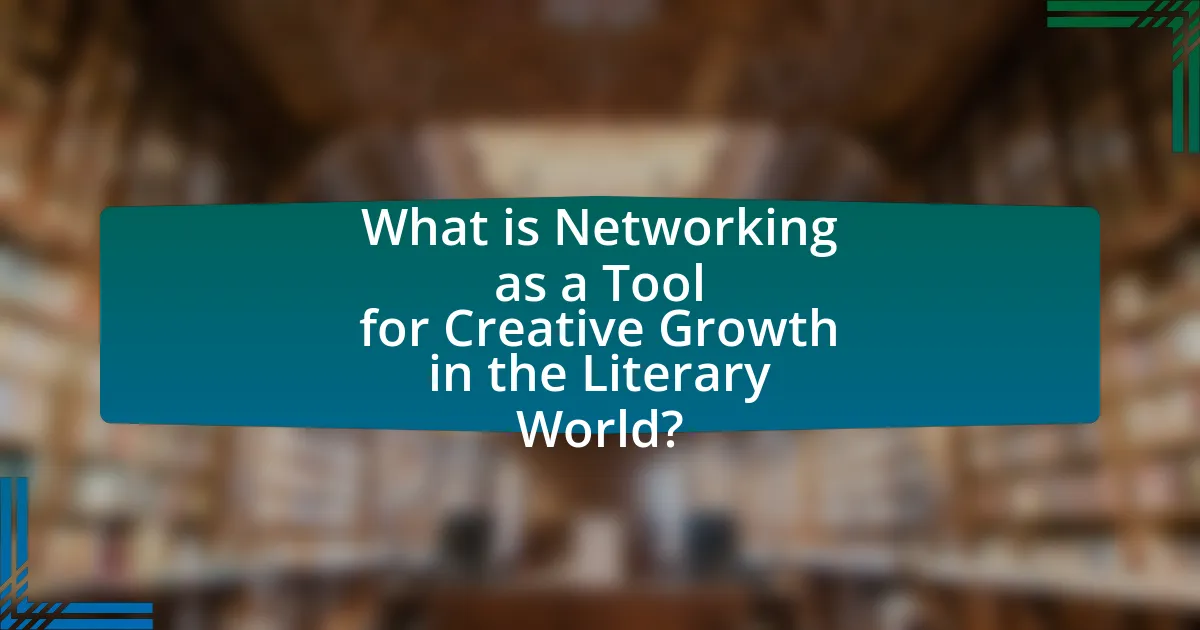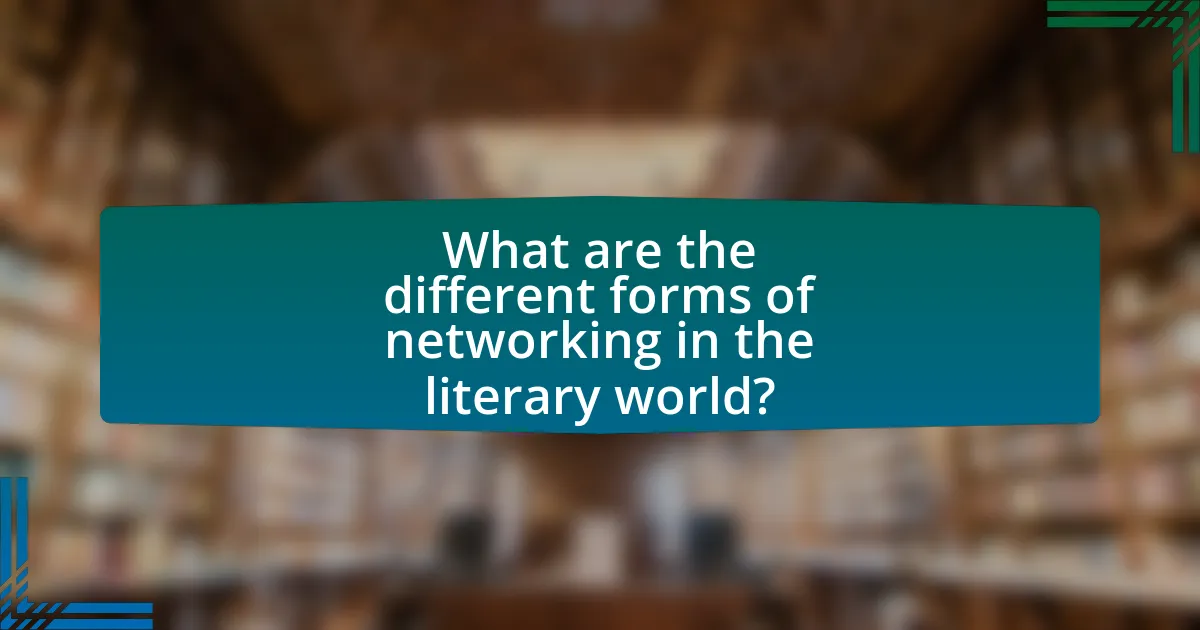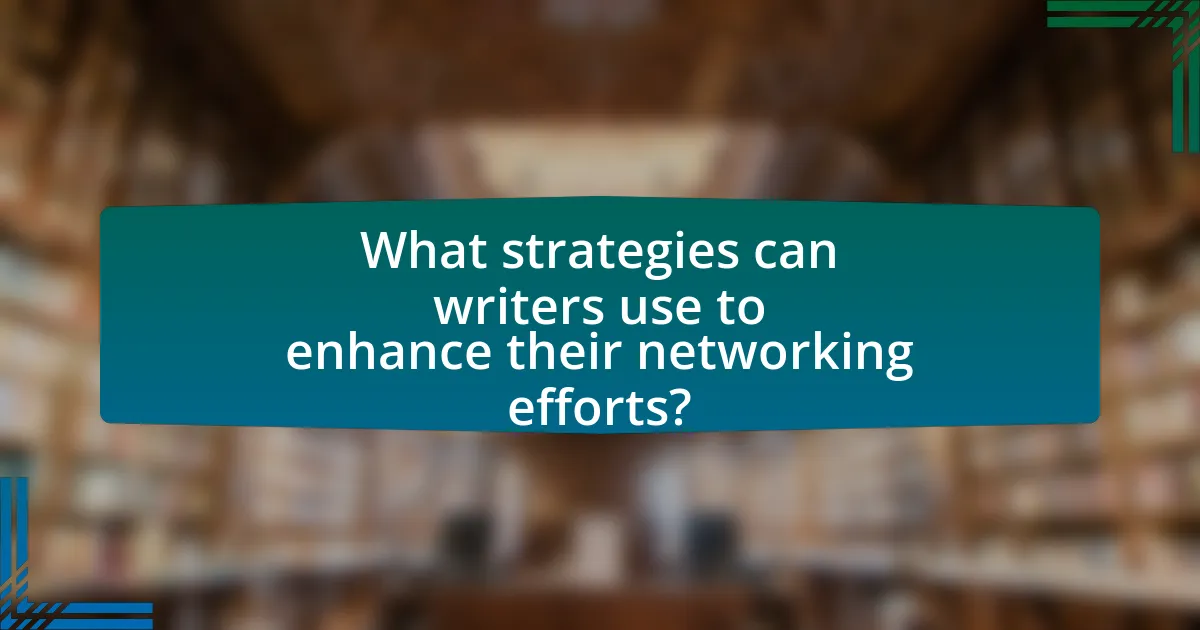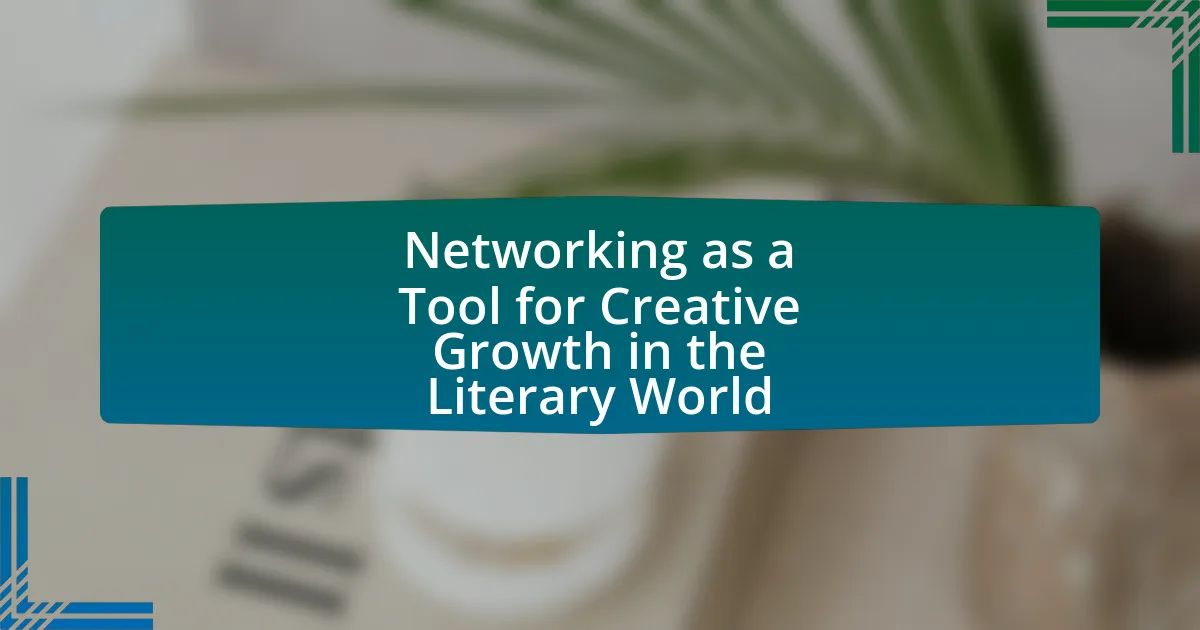Networking is a crucial tool for creative growth in the literary world, enabling connections among writers, publishers, and industry professionals. It facilitates the exchange of ideas, feedback, and collaboration, which enhances writing skills and broadens perspectives. Key elements of effective networking include building genuine relationships, engaging in meaningful conversations, and participating in literary communities. Various forms of networking, such as literary festivals, workshops, and online platforms, provide opportunities for writers to connect and advance their careers. The article explores how networking influences creativity, enhances collaborative efforts, and contributes to career advancement in literature, while also offering practical strategies for writers to build and maintain their networks.

What is Networking as a Tool for Creative Growth in the Literary World?
Networking serves as a vital tool for creative growth in the literary world by facilitating connections among writers, publishers, and industry professionals. These connections enable authors to share ideas, gain feedback, and collaborate on projects, which can enhance their writing skills and broaden their perspectives. For instance, participation in literary festivals and workshops often leads to valuable relationships that can result in mentorship opportunities and increased visibility for emerging authors. Research indicates that 70% of jobs are found through networking, highlighting its importance not only in career advancement but also in fostering creative partnerships that can lead to innovative literary works.
How does networking influence creativity among writers?
Networking enhances creativity among writers by facilitating the exchange of ideas, experiences, and feedback. When writers connect with peers, they gain access to diverse perspectives that can inspire new concepts and approaches in their work. Research indicates that collaboration and interaction within a network can lead to increased innovation; for instance, a study published in the Journal of Creative Behavior found that writers who engage in networking activities report higher levels of creative output and satisfaction. This exchange not only broadens a writer’s understanding of different styles and genres but also fosters a supportive environment that encourages experimentation and risk-taking in their writing.
What are the key elements of effective networking in literature?
The key elements of effective networking in literature include building genuine relationships, engaging in meaningful conversations, and actively participating in literary communities. Building genuine relationships fosters trust and collaboration among writers, editors, and publishers, which can lead to opportunities for mentorship and partnership. Engaging in meaningful conversations allows individuals to share insights, feedback, and resources, enhancing the creative process. Actively participating in literary communities, such as workshops, book clubs, and literary festivals, provides exposure to diverse perspectives and can lead to valuable connections that support career growth. These elements are essential for creating a supportive network that can facilitate professional development and creative collaboration in the literary field.
How does collaboration enhance creative output?
Collaboration enhances creative output by combining diverse perspectives and skills, leading to innovative ideas and solutions. When individuals from different backgrounds work together, they bring unique insights that can challenge conventional thinking and inspire new approaches. Research indicates that collaborative environments foster creativity; for instance, a study published in the Journal of Creative Behavior found that teams with varied expertise produced more original ideas compared to individuals working alone. This synergy not only amplifies individual creativity but also creates a supportive atmosphere where experimentation and risk-taking are encouraged, further driving creative growth.
Why is networking essential for literary professionals?
Networking is essential for literary professionals because it facilitates connections that can lead to collaboration, opportunities, and career advancement. By engaging with peers, editors, agents, and readers, literary professionals can share ideas, gain insights, and access resources that enhance their work. Research indicates that 85% of jobs are filled through networking, highlighting its importance in career development. Additionally, networking can provide access to workshops, literary events, and publishing opportunities, which are crucial for growth in the competitive literary field.
What opportunities does networking create for writers?
Networking creates opportunities for writers by facilitating connections with industry professionals, which can lead to collaborations, mentorships, and access to publishing opportunities. Through networking, writers can meet editors, agents, and fellow authors who can provide valuable insights and feedback on their work. For instance, a study by the Authors Guild found that 76% of authors reported that networking helped them gain visibility and find publishing deals. Additionally, networking events often feature workshops and panels that enhance writers’ skills and knowledge, further contributing to their professional growth.
How does networking contribute to career advancement in literature?
Networking significantly contributes to career advancement in literature by facilitating connections that can lead to opportunities for collaboration, mentorship, and exposure. These connections often result in invitations to literary events, workshops, and publishing opportunities, which are crucial for gaining visibility in the literary community. For instance, authors who engage with peers and industry professionals through networking are more likely to receive recommendations for publishing deals or participation in literary festivals, enhancing their career prospects. Studies indicate that 70% of jobs are found through networking, underscoring its importance in various fields, including literature.

What are the different forms of networking in the literary world?
Different forms of networking in the literary world include author collaborations, literary festivals, writing workshops, online platforms, and social media engagement. Author collaborations allow writers to co-create works, enhancing visibility and reach. Literary festivals provide opportunities for authors to connect with readers and industry professionals, fostering relationships that can lead to future projects. Writing workshops facilitate peer feedback and mentorship, creating a supportive community for writers. Online platforms, such as writing forums and blogs, enable authors to share their work and connect with a broader audience. Social media engagement allows writers to build personal brands and interact with fans and fellow authors, expanding their professional network. These networking forms are essential for creative growth, as they provide resources, support, and exposure in the competitive literary landscape.
How do online platforms facilitate networking for writers?
Online platforms facilitate networking for writers by providing accessible spaces for collaboration, communication, and exposure to diverse audiences. These platforms, such as social media, writing forums, and dedicated literary websites, enable writers to connect with peers, mentors, and industry professionals, fostering relationships that can lead to opportunities for collaboration, feedback, and publication. For instance, platforms like Twitter and LinkedIn allow writers to engage in discussions, share their work, and participate in writing communities, which can enhance their visibility and credibility in the literary field. Additionally, statistics show that 70% of writers find job opportunities through networking, highlighting the effectiveness of these online platforms in expanding professional connections.
What are the most popular online communities for writers?
The most popular online communities for writers include Wattpad, Scribophile, and Reddit’s r/writing. Wattpad boasts over 90 million users, allowing writers to share their stories and receive feedback. Scribophile focuses on critique and offers a structured environment for writers to improve their craft, with a community of dedicated writers. Reddit’s r/writing provides a platform for discussions, advice, and sharing experiences among writers, fostering a supportive network. These communities are widely recognized for their engagement and resources, making them essential for writers seeking growth and connection.
How can social media be leveraged for literary networking?
Social media can be leveraged for literary networking by facilitating connections among writers, readers, and industry professionals. Platforms like Twitter, Instagram, and Facebook allow authors to share their work, engage with their audience, and participate in literary discussions. For instance, Twitter’s hashtag system enables writers to join conversations around specific topics or events, such as #amwriting or #bookcommunity, which can lead to collaborations and increased visibility. Additionally, social media provides opportunities for authors to connect with literary agents and publishers through direct messaging or by participating in pitch events like #PitMad. According to a 2021 survey by the Authors Guild, 70% of authors reported using social media to promote their work, highlighting its effectiveness in building a professional network.
What role do literary events play in networking?
Literary events serve as crucial platforms for networking among writers, publishers, and literary enthusiasts. These gatherings facilitate direct interactions, allowing participants to exchange ideas, collaborate on projects, and establish professional relationships. For instance, events like book fairs and author readings often lead to partnerships that can enhance visibility and career opportunities for emerging authors. Research indicates that 70% of authors find new contacts and opportunities through literary events, underscoring their significance in fostering connections within the literary community.
What types of events are most beneficial for writers?
Writers benefit most from events such as literary festivals, workshops, and writing conferences. Literary festivals provide exposure to diverse audiences and opportunities to engage with fellow writers and industry professionals. Workshops offer hands-on experience and skill development, allowing writers to refine their craft through feedback and collaboration. Writing conferences facilitate networking, where writers can connect with agents, publishers, and other writers, enhancing their professional relationships and career prospects. These events are essential for fostering creativity and expanding a writer’s network, which is crucial for success in the literary world.
How can writers effectively engage at literary festivals?
Writers can effectively engage at literary festivals by actively participating in discussions, networking with other authors, and attending workshops. Engaging in panel discussions allows writers to share their insights and connect with audiences, while networking fosters relationships that can lead to collaborative opportunities. Workshops provide practical skills and knowledge that enhance a writer’s craft. According to a study by the Association of Writers & Writing Programs, 70% of writers reported that networking at events significantly contributed to their professional growth. This demonstrates that active participation and relationship-building at literary festivals are crucial for a writer’s development in the literary world.

What strategies can writers use to enhance their networking efforts?
Writers can enhance their networking efforts by actively participating in writing workshops and literary events. Engaging in these activities allows writers to meet peers, industry professionals, and potential mentors, fostering valuable connections. Research indicates that networking in creative fields can lead to collaborative opportunities and increased visibility, as highlighted in a study by the National Endowment for the Arts, which found that artists who networked effectively reported higher rates of project success and career advancement. Additionally, utilizing social media platforms specifically designed for writers, such as Twitter and LinkedIn, can facilitate connections with a broader audience and industry influencers, further enhancing networking potential.
How can writers build meaningful connections in the literary community?
Writers can build meaningful connections in the literary community by actively participating in workshops, literary events, and online forums. Engaging in these activities allows writers to meet peers, share experiences, and receive feedback, which fosters collaboration and support. For instance, attending events like the Association of Writers & Writing Programs (AWP) Conference can provide networking opportunities with established authors and industry professionals, enhancing visibility and credibility within the community. Additionally, joining writing groups or online platforms such as Goodreads or Wattpad can facilitate ongoing interactions and relationships, further solidifying a writer’s presence in the literary landscape.
What are the best practices for approaching other writers?
The best practices for approaching other writers include being respectful, personalizing your communication, and offering value. Respectful communication establishes a positive foundation, while personalizing messages shows genuine interest in their work. Offering value, such as sharing insights or resources, fosters a mutually beneficial relationship. Research indicates that personalized outreach increases response rates by up to 50%, highlighting the effectiveness of tailored communication in networking.
How can writers maintain relationships with their network?
Writers can maintain relationships with their network by regularly engaging with their contacts through communication and collaboration. Consistent outreach, such as sending updates about their work, sharing relevant resources, or offering support, fosters a sense of community and keeps connections active. Research indicates that networking can lead to increased opportunities; for instance, a study by the Harvard Business Review found that 70% of jobs are filled through networking. This highlights the importance of maintaining relationships, as strong networks can provide valuable feedback, collaboration opportunities, and access to new audiences.
What common pitfalls should writers avoid in networking?
Writers should avoid being overly self-promotional in networking situations. This behavior can alienate potential connections and create a negative impression. Instead, writers should focus on building genuine relationships by actively listening and engaging with others. Research indicates that networking is most effective when it emphasizes mutual benefit rather than self-interest, as highlighted in studies on professional relationship-building. Additionally, writers should steer clear of neglecting follow-ups after initial meetings, as maintaining contact is crucial for fostering long-term connections.
How can writers ensure they are not perceived as opportunistic?
Writers can ensure they are not perceived as opportunistic by prioritizing genuine relationships over transactional interactions. Building authentic connections with peers, mentors, and audiences fosters trust and respect, which are essential for a positive reputation in the literary community. Engaging in meaningful conversations, offering support to others, and sharing insights without expecting immediate returns demonstrate a commitment to collaboration rather than self-serving motives. Research indicates that networks built on mutual benefit and authenticity lead to long-term success and credibility in creative fields.
What are the signs of ineffective networking practices?
Ineffective networking practices are indicated by a lack of meaningful connections, poor follow-up, and an absence of mutual benefit. When individuals fail to establish genuine relationships, they often miss opportunities for collaboration and support. Additionally, not following up after initial meetings can lead to lost connections and diminished interest from potential partners. Research shows that networking is most effective when it fosters reciprocal relationships; thus, a one-sided approach, where only one party benefits, signifies ineffective networking.
What practical tips can enhance networking for creative growth?
To enhance networking for creative growth, actively participate in industry events such as workshops, conferences, and literary festivals. Engaging in these gatherings allows individuals to meet like-minded creatives, share ideas, and establish valuable connections. Research indicates that networking can lead to collaborative opportunities, with 85% of jobs filled through networking, highlighting its importance in career advancement. Additionally, utilizing social media platforms like LinkedIn and Twitter to connect with industry professionals can further expand one’s network and visibility in the literary community.



